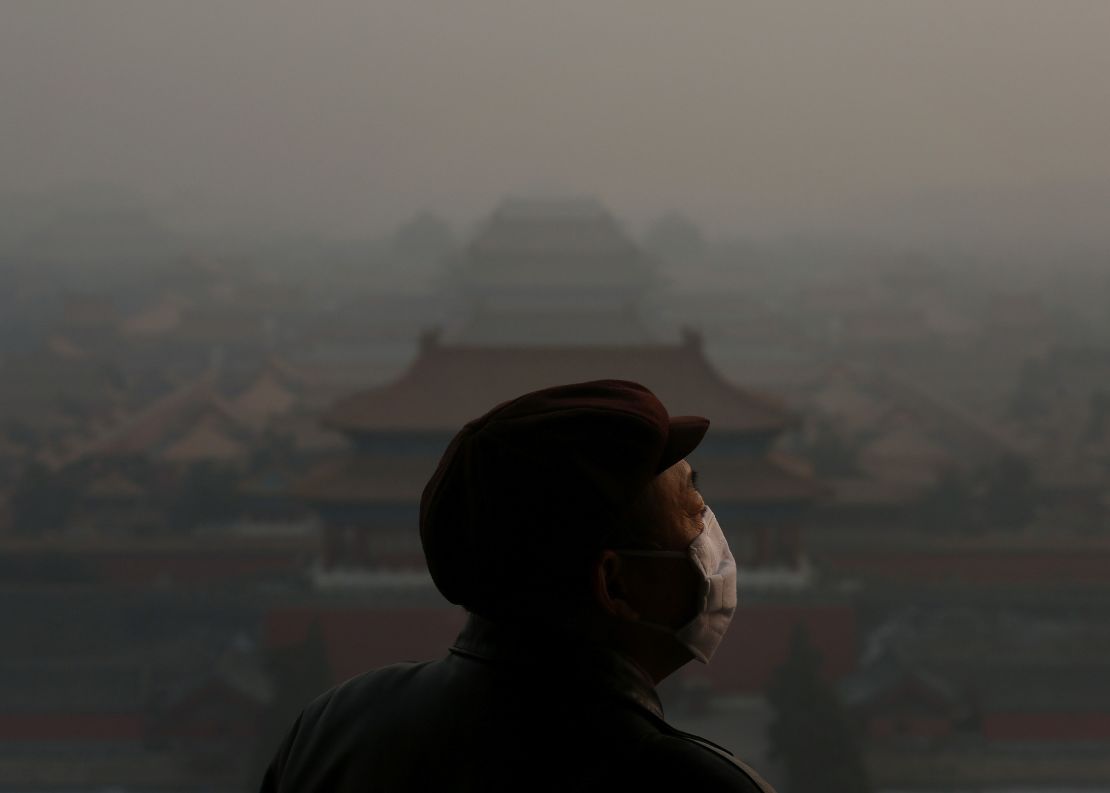Editor’s Note: A version of this story appeared in CNN’s Meanwhile in China newsletter, a three-times-a-week update exploring what you need to know about the country’s rise and how it impacts the world. Sign up here.
Beijing was once known as one of the world’s most polluted cities, with dense smog and acrid air a daily reality for residents.
Now, its skies are mostly blue — a sign the Chinese capital is entering a new era of clean air, the country’s Minister of Ecology and Environment claimed last Wednesday.
“The ‘Beijing blue’ has gradually become our new normal,” said Huang Runqiu, the minister, according to state-run tabloid Global Times, as the city recorded its best monthly air quality since records began in 2013.
Though Chinese cities have long topped global rankings of the world’s worst air quality, they have shown steady improvement over the years. Beijing only recorded 10 days of heavy air pollution last year, Huang said — a drop of nearly 80% since 2015. Recent photos from Beijing show clear blue skies and summer sun, once a rarity in the city of approximately 21 million.
The turnaround in Beijing’s air quality illustrates how successful the country’s anti-pollution campaign has been since it began in 2013 — the year of Beijing’s infamous “air-pocalypse,” when smog got so bad that levels of PM2.5, a microscopic pollutant, reached 900 micrograms per square meter, 90 times higher than the World Health Organization’s recommended daily level.
The air-pocalypse attracted global media attention and forced the issue into China’s mainstream — so much so, that one enterprising local brewery even named a beer after it, promising discounts on smoggy days.
For years, pollution in the capital had been euphemistically referred to as “fog,” but now, armed with new information on the dangerous effects of poor air quality, residents were no longer willing to tolerate days of labored breathing.
“It wasn’t simply the irritating Beijing cough that was attacking residents daily — it was something much worse,” said Daniel Gardner, emeritus professor at Smith College and author of “Environmental Pollution in China: What Everyone Needs to Know.”
“Now, when they were coughing, it was a sign that they were taking in particulate matter that leads to morbidity and mortality,” he added. “And so, I think people now began to see that quality of air very differently in 2013.”

Terms such as PM2.5 soon became part of everyday vocabulary, as people began to arrange their lives around the varying levels of pollution. And as public awareness grew, protests against coal plants began emerging in cities like Kunming and Shenzhen.
At the time, Global Times reported that public outrage was “derailing” the country’s economic growth — but, Gardner said, the government had already begun shifting its mindset.
Xi Jinping, who became president in March 2013 just two months after the air-pocalypse, saw an opportunity. By pledging to clean up pollution, he could win public support, improve China’s battered international image, lure back worried foreign tourists and expat workers, and give himself a PR boost all at once.
“The first crisis that comes across his desk is the air-pocalypse. It wasn’t just Beijing, it was in all of north China, and it made a splash,” said Gardner. “2013 was an important attitudinal tipping point, where the government is now openly saying, we are leaving behind this ‘economic growth at all cost’ policy and moving in this new direction where there is harmony between economic growth … and environmental stewardship.”
Starting that year, the government invested billions of dollars into a national air pollution action plan. It rolled out new regulations, set up nationwide air monitoring stations, and began shutting down coal mines and coal plants. By 2014, China had declared a national “war against pollution.”
At first, Beijing tolerated public protests because they were localized — focusing on specific power plants in the protesters’ neighborhoods, or on local officials who had violated environmental regulations.
But that soon began to shift as the protests took on a broader scope — fueled in part by “Under the Dome,” a 2015 documentary that criticized state-owned companies, corrupt officials, and government ministries for their role in the air quality crisis. More than 200 million people watched the film within its first week, sparking fierce online debate before censors banned the film entirely.
“What I think the government was worried about, is a movement becoming national,” said Gardner. “They saw people in Beijing and Kunming and Lanzhou, in every part of China, watching this same documentary and hearing the same message … I think the perception was now that the target could grow, and go beyond the local, if this were allowed to continue.”
As the ruling Communist Party, headed by Xi, tightened its control on civil society and clamped down on social activism, police swiftly shut down environmental protests in Chengdu in 2016 and in Wuhan in 2019. Several other documentaries on environmental issues like plastic waste were also banned.
All the while, Xi prided himself on China’s antipollution campaign, often shutting down factories and limiting the number of cars on the road to ensure blue skies during important events such as a 2014 summit of Asia Pacific leaders.
Despite the improvements, there’s still a long way to go — for instance, those temporary blue skies often rebound with heavy smog. And it’s hard to know whether improvements are being seen across the country or whether the pollution is just migrating from Beijing elsewhere — especially with new plans introduced this year for dozens of coal-fired furnaces and power plant units. Environmentalists also have to be careful not to cross any political red lines, lest they anger the central government.
But viewed from once-smoggy Beijing, it’s clear that concerted efforts have paid off — perhaps one of the few times in recent years public outrage has successfully spurred Chinese authorities to act, even if those efforts were carefully managed and quickly suppressed.
China reports no new local Covid-19 cases for first time since July
China reported no new locally transmitted Covid-19 cases on Monday for the first time since July, according to its National Health Commission (NHC), the latest sign that the country’s Delta variant outbreak is beginning to lessen.
Chinese authorities have been grappling with the spread of the highly contagious Delta variant since July 20, when a cluster of Covid-19 infections were detected among airport cleaning staff in the eastern city of Nanjing.
Since then, it has spiraled into the worst outbreak China has seen in over a year, spreading to more than half of the country’s 31 provinces and infecting more than 1,200 people. The surging cases driven by Delta were seen as the biggest challenge yet to China’s zero-Covid strategy, which it had relied on to stamp out previous local flare-ups.
Local authorities responded by doubling down on the zero-tolerance approach, placing tens of millions of residents under strict lockdown, rolling out massive testing and tracing campaigns and restricting domestic travels.
The stringent measures appeared to be working. Daily caseload of local infections has fallen steadily over the past week into the single digits, down from more than 100 from its peak two weeks ago.
And on Monday, the country reported 21 imported cases and zero locally transmitted symptomatic infections – the first time no local cases have been recorded since July 16. It also reported 16 asymptomatic cases, all of which were imported too, according to the NHC. (China keeps a separate count of symptomatic and asymptomatic cases and does not include asymptomatic carriers of the virus in the official tally of confirmed cases.)
If the trend continues, China could become the world’s first country to control a major Delta outbreak.
Photo of the Day

A damaged vehicle is seen at the blast site of a suicide bomb attack targeting a motorcade carrying Chinese personnel in Pakistan’s southwest Balochistan province on Friday. Two Pakistani children were killed and four people were injured, including a Chinese national, according to Pakistani authorities. The Balochistan Liberation Army, a militant separatist group, has claimed responsibility for the attack. This is the second terrorist attack targeting Chinese nationals in Pakistan in recent weeks. In July, a suicide bomber attacked a bus carrying Chinese workers to a dam construction in northern Pakistan, killing 13 people, including 9 Chinese. Islamabad said the attack had been carried out by “the Pakistani Taliban out of Afghanistan.”
China passes sweeping data privacy law
China is getting even tougher on data privacy.
The country recently passed sweeping new rules about the collection and use of personal data. The Personal Information Protection Law will take effect November 1, and prohibits “illegally collecting, using, processing, transmitting, disclosing and trading people’s personal information,” according to state-run Xinhua News Agency.
Before this, China had no law in place specifically dealing with the collection and use of such data. Law enforcement had relied on legal provisions scattered across existing laws to handle cases related to data privacy.
The full text of the law is not yet public, but Xinhua reported that, among other things, it “clarifies” rules governing the “processing” and “provision” of personal information across borders.
News of the law comes as some Chinese tech firms, including ride-hailing company Didi, have been accused of mishandling user data in recent months. Shortly after Didi went public in the United States, Chinese regulators accused it of “illegally collecting and using personal information.” Beijing has cited risks that the misuse of data poses to national security as regulators crack down on companies that list overseas.
– By Jill Disis and Steven Jiang
Around Asia
- US President Joe Biden on Friday announced his intention to nominate Rahm Emanuel as ambassador to Japan and Nicholas Burns as ambassador to China. Emanuel is a former mayor of Chicago, chief of staff to President Barack Obama, a senior adviser for President Bill Clinton and a member of Congress representing Illinois. Burns, a career diplomat and longtime foreign policy hand, has served presidents of both parties.
- An Afghan mother delivered a baby girl just after touching down at Ramstein Air Base in Germany Saturday aboard a US military evacuation flight, the US Air Force said on its social media.
- Australian Prime Minister Scott Morrison hinted at an end to the country’s zero Covid-19 infections strategy in an opinion piece published Sunday, warning Australians to expect a rise in infections as restrictions relax.




